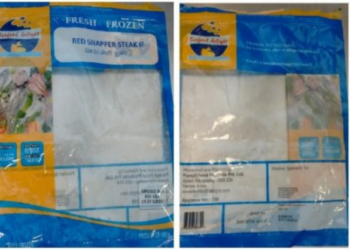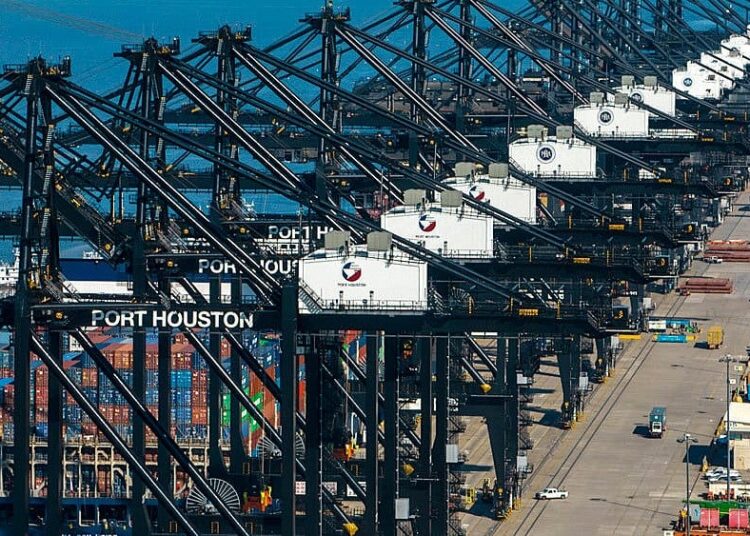Ports in Houston and Corpus Christi, Texas, posted modest gains in freight movements during September, while the Port of New Orleans saw mixed results in container and breakbulk shipments.
Port Houston’s monthly container flows up slightly in September
Port Houston handled 329,462 twenty-foot equivalent units in September, a 1% increase from the same period in 2023.
Loaded imports were up 4% year over year at 162,338 TEUs, while loaded exports were down 8% year over year in September at 114,299 TEUs.
Overall, container volume is up 9% year to date at Port Houston’s terminals, totaling 2.6 million TEUs. Total container tonnage is up 9% year to date at 28.4 million tons.
“General cargo is still down for the year, but the steel market is slowly improving,” Charlie Jenkins, CEO of Port Houston, said during the port’s monthly commission meeting on Tuesday. “Total TEU volumes remain very, very strong in the container market.”
Imports of steel products were up 25% year over year to 435,152 tons in September.
“The big impact on the general cargo is really the loss of autos and loss of Volkswagen,” Jenkins said. “Autos are down 89% year to date for the shift into that customer.”
Volkswagen Group of America announced in 2022 that it was moving its North America automotive shipping hub from Houston to the Port of Freeport, Texas. Earlier this month, Volkswagen launched the $114 million automotive terminal in Freeport, aiming to handle up to 140,000 passenger vehicles annually.
Port Houston recorded 689 ship calls in September, compared to 688 in the same month in 2023. The port reported 314 barge calls in September, a 9% y/y increase.
Jenkins also gave the commission an update on tariffs for the port’s purchase of eight electric ship-to-shore container cranes for more than $113 million in July.
Related: Gulf Coast ports slam US tariffs on Chinese container cranes
Port Houston officials said they will have to pay $28.5 million in duty fees for importing eight ship-to-shore cranes from China. (Photo: Port Houston)
The cranes are being manufactured by Zhenhua Heavy Industries Co., a China-based, state-owned company and the world’s largest manufacturer of container cranes, accounting for over 70% of the world market.
Under tariffs on Chinese imports initiated by the Biden administration in May, the eight container cranes are subject to a 25% duty, about $28.5 million in taxes.
In September, U.S. Trade Representative Katherine Tai announced that Chinese-made ship-to-shore cranes ordered prior to May 14, 2024, and cranes that enter the U.S. prior to May 14, 2026, would be excluded from the tariffs.
“Our team worked diligently to have these cranes covered in a previous order before the tariffs went into effect, if at all possible,” Jenkins said. “Unfortunately, only three cranes we ordered are covered under the rules. The eight cranes ordered in July are still underneath the tariff, with the total impact about $28 million. I believe we’re the only port impacted in the nation with this tariff, and it’s a pretty big hit.”
Port of New Orleans appoints new CEO, sees surge in breakbulk cargo
The Port of New Orleans recently announced Beth Ann Branch as port president and CEO, as well as CEO of the New Orleans Public Belt Railroad beginning Dec. 1.
Branch has been working as chief commercial officer at the Alabama Port Authority in Mobile since 2021. Prior to that role, Branch led business development and international marketing for the Port of Oakland’s maritime division.
Additionally, Branch worked in leadership positions at shipping giant Maersk for 18 years in the company’s U.S. regional headquarters outside New York and global headquarters in Copenhagen, Denmark.
“Port NOLA plays an essential role in driving economic growth for our region and state, and I look forward to building on this strong foundation in global commerce,” Branch said in a news release.
In June, Brandy D. Christian stepped down as the port’s CEO and president to pursue an opportunity in the private sector.
The Port of New Orleans’ container volume decreased 10.4% y/y in September to 36,931 TEUs.
Breakbulk cargo totaled 95,662 short tons in September, a 62% jump compared to the same month in 2023.
Breakbulk cargo at the Port of New Orleans totaled 95,662 short tons in September, boosted by imports of steel. (Photo: Port of New Orleans)
The top breakbulk commodity was steel, and breakbulk imports of natural rubber and project cargo rose, Kimberly Curth, Port of New Orleans spokeswoman, told FreightWaves.
“The top containerized commodities were plastic resins, various chemicals and paper on the export side,” Curth said. “For imports, we had coffee, wood products, and chemicals.”
The port handled 9,745 Class I rail car switches in September, a 23% increase from September 2023. The port handles switching operations for six Class I railroads: BNSF, CN, CSX, CPKC, Norfolk Southern and Union Pacific.
Crude oil shipments slip at Port of Corpus Christi
The Port of Corpus Christi handled 17.09 million tons of cargo in September, a 0.1% increase compared to the same year-ago month, when it handled 17.07 million tons of freight.
Total shipments of crude oil dipped at the port in September, when Corpus Christi handled 10.7 million tons, compared to 11.1 million tons in 2023.
Exports of crude oil totaled 10 million tons, a 2% year-over-year decrease. Imports fell 16% y/y to 698,240 tons.
Petroleum shipments increased 1% year over year in September to 4.99 million tons, with exports totaling 4 million tons during the month.
Dry bulk cargo rose 47% y/y to 761,692 tons, while shipments of bulk grain increased 41% to 267,600 tons.
Liquid bulk cargo volumes totaled 85,290 tons in September, a 21% year-over-year increase from 2023.
The Port of Corpus Christi had 318 barge calls in September, a 30% y/y decline. Ship calls during September totaled 201, compared to 209 in September 2023.
The post Gulf Coast ports post sluggish cargo movements in September appeared first on FreightWaves.















